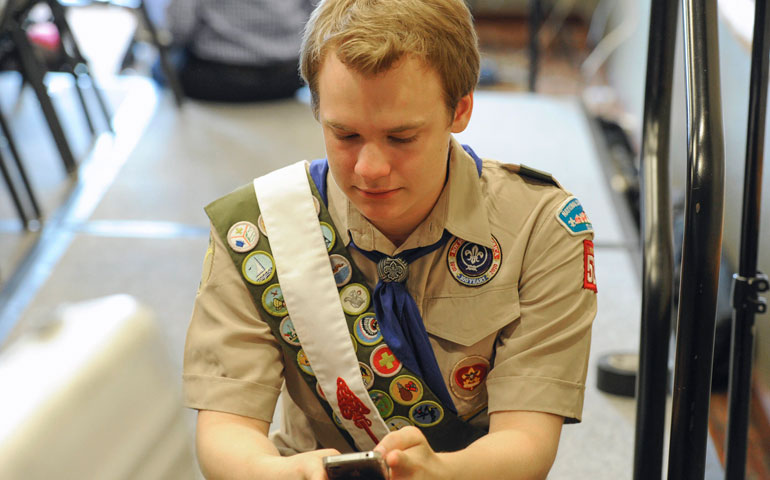
Pascal Tessier, 16, who was facing expulsion from the Boy Scouts because he is gay, sends out a text message after a resolution to allow openly gay Scouts was passed May 23. (CNS/Reuters/Michael Prengler)
On Easter Sunday, New York Cardinal Timothy Dolan appeared on television and reaffirmed Catholic teaching regarding the impermissibility of same-sex marriage. He said, however, that the Catholic church must ensure "that our defense of marriage is not reduced to an attack on gay people. And I admit, we haven't been too good at that."
For Dolan and most other bishops, church teaching on the immorality of homosexual acts and same-sex marriage is not a matter for open debate. However, what is open for discussion, Dolan seems to suggest, is the consistency of Catholic witness regarding the inalienable dignity and value of gay and lesbian persons. If the Catholic church is to make good on the claim that it is not anti-gay, then it will have to stand up for the personal dignity of gays and lesbians with the same force with which it has stood up for the dignity of the unborn and the rights of immigrants.
Dolan is president of the U.S. Conference of Catholic Bishops. In that capacity, he might encourage his brother bishops to consider whether the public policy positions of individual bishops and the bishops' conference itself are giving a consistent testimony to the essential distinction in Catholic teaching between the dignity and value of gay and lesbian persons and the impermissibility of same-sex marriage. The bishops might begin by considering their traditional support of the Boy Scouts of America.
The National Council of the Boy Scouts of America recently approved a resolution that would remove the ban prohibiting gay youth from joining the Boy Scouts. They decided, however, to leave in place the ban of gays and lesbians serving as Scout leaders. Bishop Paul Loverde of Arlington, Va., has said that in the light of the Boy Scout resolution, Catholic parishes might have to reassess their support of Catholic Scout troops. He is right to call for such a reassessment, but not because the Boy Scouts voted to allow gay youth to join. Catholic bishops and parishes should reassess their support because the Scouts continue to ban gay and lesbian leaders. It is the latter policy, not the former, that stands in conflict with Catholic teaching.
My own family has been deeply involved in Scouting for years. I have four sons, three of whom are Eagle Scouts, and the fourth soon will be. My son Andrew is not only an Eagle Scout; he served as senior patrol leader of his Catholic troop. He also spent three summers as a leader at a Boy Scout summer camp. Because of his reputation for relating well to the younger Scouts, whenever boys became homesick or there was a disciplinary issue, more often than not they were sent to Andrew for counseling and support. Unfortunately, because of current Boy Scout policy, that is a role he can no longer play. During his freshman year of college Andrew publicly acknowledged his same-sex orientation and was therefore no longer allowed to serve as a Scout leader.
The official position of the Boy Scouts of America is irreconcilable with the Catholic teaching on the dignity of gay and lesbian persons and its vital distinction between sexual orientation and sexual behavior. Allowing gay youth to join the Boy Scouts and allowing gay and lesbian adults to serve as leaders is not condoning homosexual behavior; it is a matter of recognizing the fundamental dignity of gays and lesbians and their right not to be discriminated against simply because of their sexual orientation. Catholic teaching insists, as Dolan reiterated, that homosexual persons are created in the image and likeness of God and are deserving of our love and respect.
One of the more reprehensible arguments often made for preserving the ban of homosexuals as adult Scout leaders is based on the unsubstantiated belief that homosexuals are more prone to sexual abuse of children than are heterosexuals. Similarly fallacious arguments have been made regarding the predilection of Roman Catholic clergy to sexual abuse children. Consequently, one would think that Catholic church leadership would be particularly sensitive to such unjust assumptions. Yet the overall silence of Catholic leadership regarding the Boy Scout controversy, apart from the troubling statements of a few bishops like Loverde, has been deafening.
Catholic bishops have no small influence on such policy matters, as Catholic parishes currently sponsor approximately 10 percent of the Boy Scout troops in the United States. The U.S. bishops' conference even maintains an official episcopal liaison to the National Catholic Committee on Scouting. Dolan might encourage his brother bishops to publicly declare their opposition to the ban against gays and lesbians serving as adult Scout leaders. Without a courageous determination to support the full Catholic teaching on homosexuality, including its insistence on the dignity of gay and lesbian persons, claims that the Catholic church is not anti-gay will continue to ring hollow.
[Richard Gaillardetz is the Joseph Professor of Catholic Systematic Theology at Boston College.]



